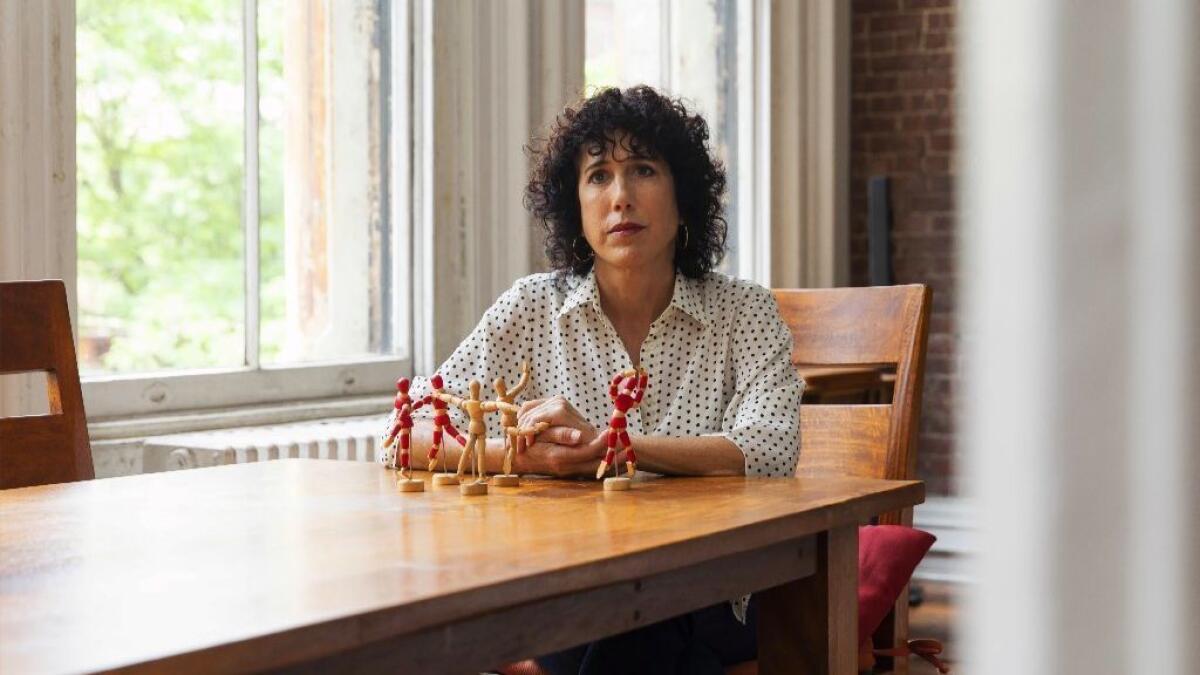Filmmaker Jennifer Fox investigates memory right along with her abuse in ‘The Tale’

- Share via
There were logical and legal reasons for documentarian Jennifer Fox to make the story of her own sexual abuse as a child into her fictional filmmaking debut. But it also felt right for “The Tale” to be told that way.
“I’d wanted to tell this story since I wrote ‘The Tale’ at 13” as an English-class assignment, says the award-winning filmmaker. “When I became a filmmaker in my 20s, I wrote a treatment and I wrote it as fiction.
“I just felt it had to be fiction. One of the reasons was obvious: Nobody would ever testify on camera. The perpetrators themselves would never speak. My mother and I would speak, but then we’d be liable [legally]. But fiction gives you the ability to be honest while changing people’s names and professions. And the past — how would I ever show the past?”
WATCH: Video Q&A’s from this season’s hottest contenders »
“The Tale” is a harrowing and cinematically accomplished account of Fox’s own realization, as an adult, that she had been willfully misremembering her first sexual relationship — when she was only 13, with a 40-something mentor. “Jennifer” (Laura Dern) is forced to face the truth when her mother (Ellen Burstyn) finds the essay she had written as a schoolgirl (Isabelle Nélisse) in the early ‘70s. What follows is the screen version of the documentarian investigating herself and her days with that coach (Jason Ritter) and his partner (Elizabeth Debicki).
The HBO movie and Dern are now nominated for Emmys. The film has collected festival awards for its screenplay and editing and played at festivals and been invited to screenings around Europe, South America, and, recently, Mexico and South Africa. Fox says “millions and millions” have viewed it on HBO. Not a bad showing for a film she says had her “shaking in her boots” that it would have viewers walking out when it screened at Sundance. Instead, she says, “we got five standing ovations.”
Perhaps the bitter pill of child sexual abuse is made easier for audiences to take by the cinematic focus on our own unreliable narration; the stories we tell ourselves to survive.
“The first thing I did in writing the script, because it’s all about memory, was, I drew up everything I remembered,” says Fox. But rather than organize those fragments into a strict three-act structure, “I thought, ‘Let me put all that away and I’m just going to investigate memory …’ That really infused the script with its own language.
“One day, I woke up and realized I actually didn’t know who I was at 13. I lost touch with her and didn’t know what she would say to me today or why she did what she did. So periodically, the [adult] protagonist, played by Laura Dern — ” Fox laughs as she names her: “ ‘Jennifer’ — actually spoke with her younger self.”
There are moments Fox calls “reframes,” in which a conversation or bit of evidence makes Jennifer “totally revisit memory” and see that the truth is different from what she remembered.
“These were artistic pillars that gave the film sort of a unique voice. But I wasn’t looking for uniqueness; I was looking for a way to express ‘mind.’ ”
Fox displays a remarkable understanding of herself at 13: of the vulnerability that made her so ripe for the picking; and of the techniques “Bill” and his accomplices used to cultivate her.
Yet, she says, “The film is not about a character being angry. Laura, as a mother and as a woman, was furious at the event of the sexual abuse. But that’s not me. I really, really had this profound desire to understand why. Why me? Why would you find this kid who looked like a 9-year-old boy attractive?”
As to the real “Bill,” his identity has been carefully obscured.
What I hope the film provides is a deep understanding of how complex and nuanced this sexual abuse is, how it happens, how children get enrolled.
— Jennifer Fox
“In lieu of being able to prosecute, the best thing we can do is to help other people with this story,” says Fox. “What I hope the film provides is a deep understanding of how complex and nuanced this sexual abuse is, how it happens, how children get enrolled.”
She hopes “it will change the conversation, which was our second goal, around child sexual abuse and memory, and trauma and memory.” With pride, she rattles off some of the legal, psychological and other organizations that have requested screeners.
However, Fox says, “We can’t escape trauma; trauma is a part of life. You hope you can avoid the worst traumas … but the question is really, ‘How do we raise resilient children?’
“Growing up Jewish, I grew up with stories of struggle and survival. Since I was a kid, my father would always tell us about our people. Storytelling is a way to help kids grow up resilient because you model that. I grew up thinking there will be difficulties, but you always have to get up again.”
More to Read
From the Oscars to the Emmys.
Get the Envelope newsletter for exclusive awards season coverage, behind-the-scenes stories from the Envelope podcast and columnist Glenn Whipp’s must-read analysis.
You may occasionally receive promotional content from the Los Angeles Times.








